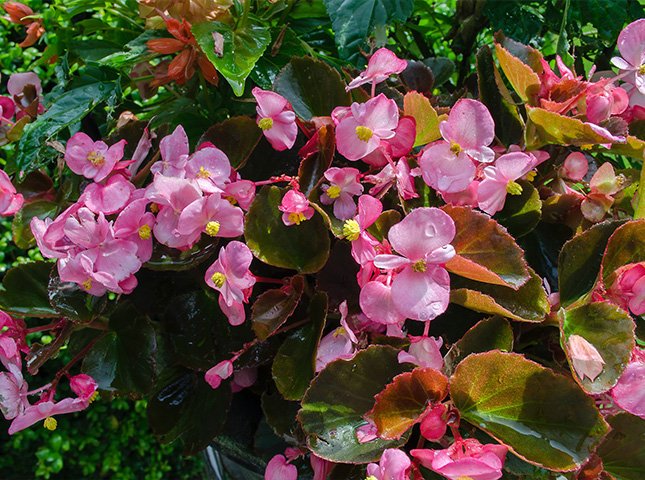Deer and begonias – two unlike things – have caught the eyes of gardeners. Do deer find the begonias tasty?
Begonias charm us with their blooms and foliage. They grow in different places. But, do deer dine on them?
Sadly, deer have a taste for begonias. Even guards and fences can’t stop them from feasting.
Gardeners must be watchful to guard their begonias. They must find methods to keep away the hungry deer. Natural repellents or research-based solutions can help. The battle goes on!
Table of Contents
Understanding Deer and Their Eating Habits
Deer, the gentle creatures of the wild, are intriguing animals. Fascinating eating habits make them unique. They have a diverse palette and understanding their dietary preferences helps us to coexist peacefully.
In search of sustenance, deer can adapt to their environment. They consume a variety of plant-based food sources like grasses, leaves, twigs, fruits and mushrooms. However, they tend to avoid begonias with strong scents or flavors that may indicate toxicity or unpleasant taste.
Deer have selective feeding patterns based on seasonal changes and availability of resources. In spring and summer they eat tender shoots and leafy greens. When food gets scarce in autumn months, they consume roughage like bark and buds.
To protect begonias from deer, use natural deterrents. Plant deer-resistant species nearby or use fencing methods. Remember to research local regulations first.
By understanding deer’s eating habits, we can appreciate their role in the ecosystem. Coexisting with these majestic animals is essential for preserving nature’s beauty.
Are Deer Attracted to Begonias?
Do deer have an affinity for begonias? Let’s investigate this perplexing inquiry. In general, deer tend to favor plants that provide higher nutrient value and are more succulent. Begonias, with their waxy leaves and bitter taste, don’t fit this description. Thus, it is unlikely that deer will munch on begonias.
Protecting Your Begonias from Deer
Protecting Your Begonias from Deer
Deer can pose a threat to the health and beauty of your begonias. To safeguard your precious plants, consider the following measures:
- Install a physical barrier: Erecting a fence around your begonias can be an effective deterrent against deer. Opt for a sturdy material that is at least 8 feet tall to ensure maximum protection.
- Use repellents: Applying deer repellents can help keep these animals at bay. Choose products that contain ingredients such as garlic, sulfur, or predator urine, as these scents tend to repel deer.
- Choose deer-resistant species: Some begonia varieties are less appetizing to deer. Consider planting species like dragon wing begonias or wax begonias, as they are reported to be less appealing to these creatures.
In addition to these preventive measures, it’s important to note that deer are adaptable creatures. Their behavior may vary depending on factors such as the availability of alternative food sources or the population density of deer in your area. By employing these protective strategies, you can give your begonias a fighting chance to thrive.
Pro Tip: Regularly inspect your begonias for any signs of deer damage, such as nibbled leaves or broken stems. Taking prompt action can prevent further harm and preserve the beauty of your plants.
Planting Deer-Resistant Varieties: Because deer think flowers are just fancy appetizers, it’s time to plant begonias that will give Bambi a run for his money.
Planting Deer-Resistant Varieties
Fear not! Your beautiful begonias can be kept safe from pesky deer. Here are 3 tips for planting deer-resistant varieties:
- Go Native: Native plants have natural defence mechanisms against deer, so pick native begonias to increase your chances of deterring them.
- Choose Strong Scents: Deer rely on smell, so ‘Dragon Wing‘ and ‘Angel Wing‘ begonias, with their strong fragrances, tend to be avoided.
- Textural Variations: Fuzzy ‘Begonia bowerae’ leaves and thorny ‘Begonia acetosa’ stems make the plants less desirable for deer.
Plus, more strategies:
- Fencing: Put a tall fence around the garden, dug in below ground level to prevent jumping or digging.
- Repellents: Use products with predator urine or strong smells to repel deer.
- Plant Companions: Plant herbs like rosemary, lavender, or sage alongside your begonias. Their strong scents will discourage deer.
By doing these things, you’ll create an environment that’s less appealing to deer, giving your begonias the chance to thrive!
Using Physical Barriers
Protect your begonias from deer with physical barriers! Install strong fences or wire meshes around your garden. Or, use netting and cloth covers over individual plants. These barriers stop deer intrusions and look great too.
Make sure the fencing is 8 feet high so deer can’t jump over. For durability, use metal or PVC pipes. Ensure netting and cloth covers are secured tightly. Portable electric fences can be a temporary measure. Maintain checks on physical barriers. Replace any damage and adjust height to keep deer away from begonias.
Applying Repellents
Begonias are lovely—but deer love them too. To keep deer away, repellents are a great solution. Here’s how:
- Select the right repellent. Sprays or granules made to deter deer are available. Read the instructions carefully and pick one that fits your needs.
- Apply it properly. Clean the begonias and remove any leaves or debris. Then follow the product directions for how much to use and where to put it.
- Reapply as needed. After rain or watering, you may need to reapply. Monitor the begonias for deer damage and reapply accordingly.
Every garden is different, so experiment to find what works best in your environment. In addition, use repellents with other protective measures like fencing or noise deterrents to maximize success.
Once, a gardener had a peculiar experience. She used a spray repellent, but one deer wouldn’t budge. She decided to try a motion-activated sprinkler system with the spray repellent. It worked! The deer was startled by the water and learned to stay away.
If one method doesn’t work, get creative and don’t give up. You can find the perfect solution to protect your begonias and appreciate their beauty.
Conclusion
Deer won’t usually eat begonias as they are toxic. These plants have substances that can hurt animals if eaten. Yet, every so often, an exception will occur. I remember a strange incident where a brave deer ate an entire begonia bed! Nature never fails to amaze us!
Frequently Asked Questions
1. Do deer eat begonias?
Deer are known to have a preference for various plants, and unfortunately, begonias are not an exception. Deer have been observed consuming begonias, especially in areas with high deer populations.
2. Are all types of begonias attractive to deer?
While it is true that deer may eat begonias, certain types of begonias are more appealing to them than others. Typically, deer exhibit a stronger preference for tuberous begonias rather than fibrous or rhizomatous begonias.
3. How can I protect my begonias from deer?
There are several methods to safeguard your begonias from deer. One effective approach is to install a physical barrier like a deer fence around your garden. Additionally, using deer repellents and planting deer-resistant plants alongside begonias can deter deer from feasting on them.
4. Do repellents really work?
Yes, repellents can be an effective deterrent when it comes to preventing deer from damaging your begonias. There are various types of repellents available, including predator urine-based ones, blood meal sprays, and homemade mixtures with ingredients like garlic and hot peppers. Applying these repellents regularly and following the instructions can significantly reduce the risk of deer feeding on your begonias.
5. Are there any natural deer-resistant alternatives to begonias?
Absolutely! If you wish to avoid the risk of deer damage altogether, you can consider planting deer-resistant alternatives to begonias. Some great options include marigolds, lavender, daffodils, salvia, and yarrow. These plants are less attractive to deer and can add beauty to your garden.
6. Can I plant begonias in areas with high deer populations?
While it is possible to plant begonias in areas with substantial deer populations, it is important to take extra precautions. Using a combination of deer-resistant plants, repellents, and physical barriers like fences can help protect your begonias. However, keep in mind that determined deer may still find a way to reach and consume your begonias, so regular monitoring is essential.


